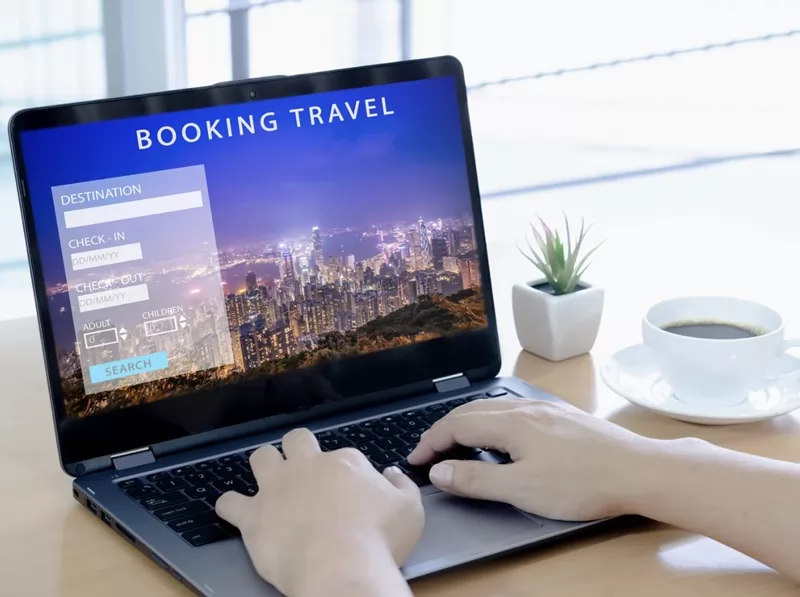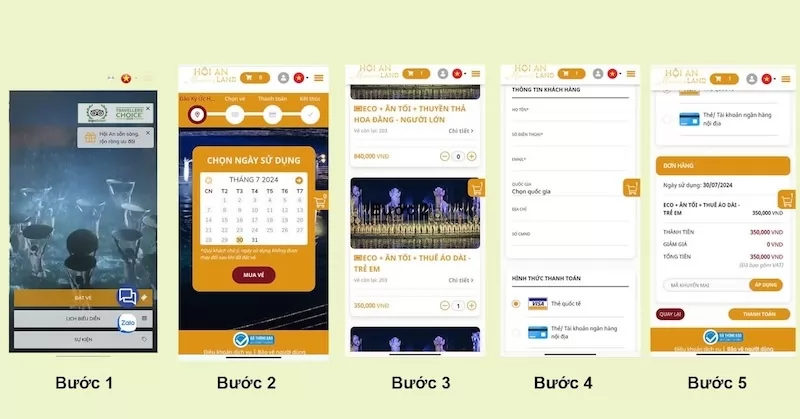
What Is a Tourist Scam? How to Identify and Avoid Travel Scams
Travel opens doors to new lands and unforgettable experiences. Yet, beneath the glittering facade of breathtaking destinations and tempting deals, the tourism industry harbors its share of hidden traps. From "ghost" tours and fake tickets to cunning overcharging schemes, fraudsters are always looking to profit from unsuspecting travelers. With Hoi An Memories Land, you'll learn about common scams, how to identify them, and what to do if you encounter one, ensuring your journeys are always safe and filled with happy memories.
1. What Exactly are Tourist Scams?

Tourist scams are fraudulent acts designed to steal money or personal information from travelers, often disguised as legitimate travel services or products. These schemes are incredibly diverse, ranging from fake deals and non-existent tours to credit card information theft.
1.1. Why is the Tourism Industry a "Fertile Ground" for Scammers?
Compared to other sectors, tourism is a prime target for fraudulent activities due to a unique combination of factors:
- High Demand, Especially During Peak Seasons: Tourist demand skyrockets during peak seasons like summer holidays and festive periods. This surge drives travelers to book services (flights, hotels, tours) early to secure their spots. Scammers exploit this FOMO (fear of missing out) on "limited-time" offers, pressuring victims to act quickly without thorough verification.
- Traveler Inexperience: Many travelers visiting new destinations lack knowledge about local prices, customs, or reliable service providers. This creates opportunities for fraudsters to offer opaque pricing or subpar services.

- The Rise of Online Bookings: Booking tours, flights, and hotels online has become incredibly popular, but it also creates significant loopholes for scammers. They easily create fake websites, social media pages, and accounts that look remarkably authentic, even mimicking the interface and domain names of official sites. The ability to buy/rent "blue ticks" (verified badges), run ads, and purchase fake engagement helps scammers build a facade of false credibility, making it hard for users to distinguish legitimate services from fraudulent ones.
1.2. Who are the Most Vulnerable to Tourist Scams?

Scammers often target vulnerable or less cautious individuals. Here are the groups at highest risk:
- First-time or solo travelers: Those with limited travel experience.
- Bargain hunters: People eager to find deals and cheap tickets.
- Frequent online service users: Individuals who regularly book services online.
- Elderly travelers: Often less tech-savvy and more trusting.
2. Common Types of Tourist Scams
2.1. Fake or Misleading Tour Packages
This is one of the most prevalent scams. Fraudsters often advertise tours at unbelievably low prices, promising luxurious services and unique itineraries. After travelers transfer deposits or full payments, the scammers vanish or provide services that are subpar and don't match the initial promises. In many cases, the tour simply doesn't exist. These individuals typically operate on social media or through unofficial websites that lack clear business licenses.
2.2. Scam Flight Tickets and Transportation Bookings
With the convenience of online ticketing, this scam has become widespread. Scammers create fake websites or use social media accounts to advertise surprisingly cheap flights and train tickets. Lured by the low prices, travelers make payments but either never receive their tickets or receive fake, invalid ones. Many people have lost money and couldn't take their trips, especially during holidays or peak seasons.

2.3. Fake Hotel, Homestay, or Airbnb Listings
Many travelers look for cheap rooms on social media groups or unofficial websites. Scammers exploit this by posting appealing photos and information about beautiful, luxurious hotels or homestays at discounted rates. However, after receiving deposits, they block communication and disappear. Upon arrival, travelers discover the booked room doesn't exist or doesn't match the description, sometimes leading to a non-existent address.
2.4. Impersonation of legitimate travel agencies
A sophisticated trick involves impersonating well-known, reputable travel companies. Scammers create websites and social media pages that mimic legitimate ones, using authentic logos and names to confuse travelers. They offer seemingly affordable tour packages and services, then demand travelers transfer deposits to personal accounts. By the time the scam is discovered, travelers realize they've dealt with a fake entity, and the lost money is often unrecoverable.
2.5. Online scams via fake websites and social media ads
Scammers frequently create fake websites or fan pages of major travel agencies, using identical images, logos, and even contact information to deceive customers. These fake sites might copy the interface and domain names to closely resemble official ones, making them hard to distinguish. A more elaborate tactic is to purchase verified Facebook "blue tick" accounts or pre-existing verified accounts, then change their names to reputable travel agencies to build absolute trust with travelers.
They also set up fake groups and personal "ghost" accounts to aggressively advertise attractive travel packages. Travelers are easily led to malicious links or asked to provide personal and credit card information, resulting in account or asset theft.
2.6. Overcharging or forced buying at tourist spots
This is a common issue at some destinations, where individuals or local groups pressure tourists to use services or buy goods at prices much higher than their actual value. These tactics include forcing tourists to buy local specialties, charging unclear service fees, using "rogue" taxis that overcharge, or tour guides colluding with shops to fleece customers. While not direct pre-payment scams, they significantly impact travelers' experience and finances.

2.7. "Ghost tours" or non-existent/misleading services
Scammers paint a beautiful picture of an ideal trip, collect money from customers, and then vanish. Alternatively, the provided service doesn't match the initial promises (e.g., substandard hotels, truncated itineraries, missing promised activities), leaving travelers with lost money and a terrible travel experience.
3. How to Spot Tourist Scams: The Red Flags
Knowing the warning signs is your best defense against falling victim to tourist scams.
3.1. Unusually Low Prices
If a tour, flight, or hotel room is advertised at a significantly lower price than the market average, be cautious. Always compare prices from multiple reputable sources before making a decision.

3.2. Unclear Company Information, Missing Tax Codes, or Fake Addresses
A legitimate travel company will always publicly display its full legal information. If you can't find a tax code, a specific office address, a business license, or if this information is vague and unclear, it's a sign of a fraudulent organization. Check company information on national business registration portals.
3.3. Poorly Designed Websites, Lacking Real Customer Reviews
Scam websites are often poorly designed, unprofessional, and may contain spelling or grammatical errors. Crucially, they typically lack genuine customer reviews or only feature generic, unusually positive feedback. To verify a website's authenticity, you can check its credibility using trusted online tools.
3.4. Transactions via Personal Accounts, No Official Contract
A legitimate travel company will always require payment to a company account and provide a clear service contract with a valid stamp and signature. If you're asked to transfer money to someone's personal account or there's no official contract, stop the transaction immediately.
3.5. Pressuring Sales Tactics, No Time to Verify Information
Scammers often create psychological pressure, urging you to make quick decisions so you don't miss out on the "last chance" offer. They won't give you enough time to research, compare, or verify information. Any offer accompanied by unusual urgency is a major red flag.

3.6. Suspicious Links, Unreputable Third-Party Payment Requests
Be wary of strange links sent via messages, emails, or social media, especially if they lead to unfamiliar payment pages. Scammers might ask you to pay through unreliable third-party gateways or untraceable money transfer methods to steal your account information or money.
3.7. Fake Reviews, Unverified Images
Fraudsters often use alluring images taken from the internet (like photos of luxurious hotels or tourist spots) for their advertisements, but these are not actual photos of the services they provide. Reviews are also often fake, created by bogus accounts with generic, unspecific content. Look for reviews on reputable platforms and cross-reference images using reverse image search.
4. How to Avoid Scams When Traveling
To have a safe and enjoyable trip, being prepared and applying these prevention tips is crucial.
4.1. Verify the credibility of travel agencies and booking platforms
Before booking any service, take the time to verify the provider's credibility.
- Travel Agency/Ticket Office: Look up their information on the national business registration portal to check for their business license, tax ID, and address. Cross-reference this with their advertised information.
- Hotel/Homestay: Check information on reputable international booking sites like Booking.com, Agoda, and Traveloka, and compare it with the information you received. Contact the hotel directly via their official phone number to confirm your reservation.
4.2. Book through reputable websites with buyer protection policies
- Flight Tickets: Book directly on the official airline website (e.g., Vietnam Airlines, Vietjet Air) or through authorized ticket agents.
- Hotels/Resorts: Prioritize booking through globally trusted platforms like Booking.com, Agoda, Traveloka, or call the hotel/resort's official hotline to confirm and book.
- Event/Show Tickets: Go to the official fan page or website of the event organizer to buy tickets. For example, if you want to see the Hoi An Memories show, book via the official Hoi An Memories Land email or website (https://booking.hoianmemoriesland.com/).

4.3. Look for real addresses, contact info, and legal registration numbers
A trustworthy travel provider will have clear and easily verifiable contact information. Their address, phone number, and social media accounts should match on all platforms. These channels should also have frequent updates.
4.4. Always request invoices, contracts, and cancellation policies
This is crucial for protecting your rights. A valid contract should include a detailed itinerary, services, price, and cancellation policy. Always demand an official invoice or receipt with the company's seal and signature. Never transfer money to a personal bank account.
4.5. Avoid deals from DMs or random social media accounts
Scammers often approach you via private messages on social media, spam emails, or pop-up ads. Don't click on strange links, and never download attachments from unknown sources.
4.6. Research customer feedback in trusted travel communities
Before booking, seek advice from experienced travelers on trusted forums and Facebook groups. However, be cautious of fake reviews and paid promotion.
4.7. Build basic digital literacy and protect your personal data
Never provide credit card numbers, CVV codes, or bank passwords over the phone, via messages, or on unsecured websites. Use strong passwords and regularly update them.
5. What to do if you suspect or fall victim to a tourist scam
If you suspect you've been scammed, acting quickly and correctly can minimize your losses and help authorities.
5.1. Stop the transaction and collect evidence immediately
Immediately stop all communication and collect all possible evidence. This includes screenshots of messages, transaction details, and copies of any fake documents.
5.2. Contact your bank to block or reverse payments
Immediately call your bank to cancel the transaction or request a chargeback.
5.3. Report the scam to local authorities or consumer protection agencies
File a report with the police and/or consumer protection agencies. Provide all the evidence you have to assist in the investigation.
5.4. Warn others by sharing your experience online
Share your story and evidence on travel forums and social media groups to raise awareness and help other travelers avoid the same scam.
Travel scams are a serious issue, but with careful preparation and a high level of vigilance, you can protect yourself. To discover more about the beauty of Hoi An and experience the world's most beautiful live-action show, contact Hoi An Memories Land for guidance and booking. We wish you a memorable trip, free from any unwanted experiences!
You might also be interested in:
>>> Top 20 Best and Most Reputable Places to Stay in Hoi An
>>> Hoi An Accommodation Guide: How to Choose Areas and Best Lodging Recommendations
-
Hotline: 1900 63 66 00
-
Press 1 For tickets
-
Press 2 For Customer Service
Latest news

Top Places to Watch the Sunset in Hoi An: Best Locations for 2026

A Comprehensive List of Restaurants in Hoi An: From Local Delicacies to International Dining 2026

Hoi An Street Food Tour: Top 10 Must-Try Local Delicacies

Top 20 Must-Visit Attractions in Da Nang You Shouldn't Miss











Comment